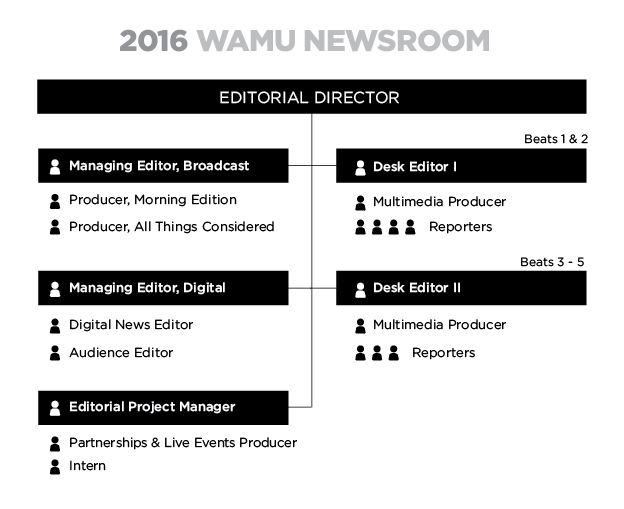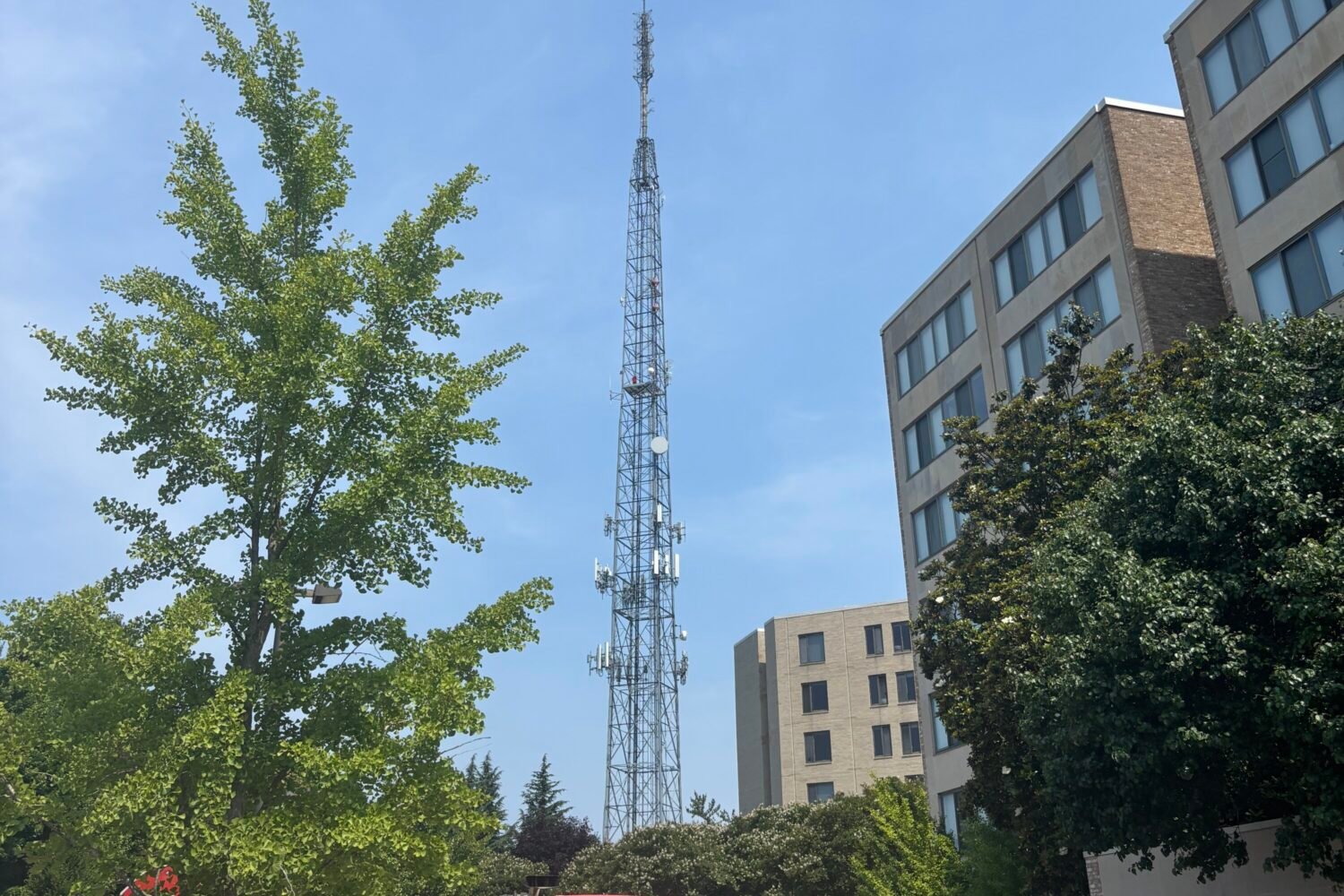WAMU is implementing a long-brewing reorganization of its newsroom, station leaders told the newsroom Wednesday afternoon. Local beats based on geography are going away, and will be replaced by five broader subject areas: Transportation and development, education and inequality, race and ethnicity, power and influence, and arts and culture.
WAMU plans to hire seven new positions, and it has eliminated what it calls in a press release “two reporter positions focused on geographic coverage.” Those would be jobs previously occupied by Virginia reporter Michael Pope and Maryland reporter Matt Bush. A senior news editor was also eliminated, but the person in it may stick around in one of the new positions, news and content chief Andi McDaniel tells Washingtonian. Bush and Pope have also been given the opportunity to apply for new positions, McDaniel says.
Patrick Madden will lead the power and influence beat, Armando Trull will be the lead on race and ethnicity, Martin Di Caro will lead transportation, and Kavitha Cardoza will head up education. The lead arts job is “still shaking out,” McDaniel says. The teams will be split, two and three, between two desk editors, and each desk will have a multimedia editor.
The changes are part of the NPR member station’s substantial overhaul under McDaniel and general manager J.J. Yore. Both wanted the station to move away from high-tempo, WTOP-style news coverage and toward stories that would be more resonant, and more shareable. “We would like to do fewer things, but better and more consistently,” McDaniel says. Local news is still what will drive the station: “That’s why we exist,” she says. But rather than stories whose importance is relative to their location, “we want the story and the topic to be what drives our coverage,” she says. The station plans to hire an editorial director who will guide its local coverage.
Some big changes are coming to the station’s digital shop, which before McDaniel arrived was separate from the newsroom. Ally Schweitzer and Martin Austermuhle, who are technically web producers but also report (Schweitzer also runs Bandwidth, WAMU’s music site), will have their titles changed to reporter. “I’m particularly excited about them being reporters because they’re models for delivering content across platforms,” McDaniel says.
A new website is coming in the fall, built around a content management system so easy that even journalists can use it, eliminating a current “pain point,” as McDaniel puts it, where reporters often have to send scripts for stories through producers to turn them into web content.
The seven new positions will shake out as revenue neutral thanks to the job cuts and the elimination of a good deal of the station’s budget for part-timers, the thinking being that it’s better to have “a full-time team devoted to thinking about these kinds of coverage” rather than “people being here part of the time, filling in,” McDaniel says.
McDaniel expects these changes to be complete by summer. The reporting teams will embark soon on listening tours to help sharpen their beats beyond their names. “We want them to have a little more crisp approach and a defined angle,” she says. The reporters will engage with leaders and stakeholders in their respective beats.
“This is step one in a big plan,” McDaniel says. “This is really the initial reset.”
Here’s the station’s press release, and an org chart of the new newsroom.
WAMU 88.5 Unveils Ambitious New Vision for a Growing Multiplatform Newsroom
Against a backdrop of shrinking newsrooms around the country, today WAMU 88.5 announced the first stage of an ambitious plan to grow its news staff and strengthen its regional coverage.
WAMU’s reimagined newsroom will focus initially on five regional beats that are especially important to the Washington region:
· Transportation and Development
· Education and Inequality
· Race and Ethnicity
· Power and Influence
· Arts & CultureInspired by multiplatform news desks at NPR and organizations outside public media, the new beats will deliver in-depth reporting via broadcast, digital, on-demand, and social platforms.
“As the NPR station in the nation’s capital, we have a responsibility to be a leader in public radio journalism—both in the quality of our on-air work and in the inventiveness of our digital offerings,” says Andi McDaniel, Senior Director of Content and News. “In the coming months, listeners will hear greater consistency on our air, and they’ll see more appealing digital content on all of our platforms.”
The new coverage teams for these beats will include multimedia producers and editors who will drive topical coverage.
To deliver this coverage, WAMU has redesigned a number of existing positions, and will be hiring for seven new roles:
· A new Managing Editor of Digital will lead efforts to engage digital audiences
· Two new Desk Editors will drive the multiplatform beat teams
· A Live Events and Partnerships Producer will leverage WAMU content into in-person experiences
· An Editorial Project Manager will manage long-term reporting projects and new initiatives
· News Producers for All Things Considered and Morning Edition will report spot news and keep listeners abreast of news headlinesA search for an Editorial Director to lead WAMU’s regional news coverage is already underway. Multimedia Producer positions will open up this Fall.
The revamped newsroom builds on WAMU’s nationally recognized successes in journalism, including reporter Kavitha Cardoza’s education reporting, transportation reporting by Martin Di Caro, and investigative work by Patrick Madden.
WAMU is making these changes while remaining budget neutral. As part of a long-planned move from geographic to topical beats, WAMU is integrating coverage of Virginia and Maryland into its new beat system. This will result in the elimination of two reporter positions focused on geographic coverage.
The Next Five Years
The changes announced today represent the first phase of an ambitious five-year plan that will add new beats and grow WAMU’s news team to triple its current size, putting it on par with news staffs of other leading public radio stations. The 2021 newsroom plan includes an investigative unit and a total of eight to 10 beats.
“As other news providers retreat from local coverage, we see a unique opportunity for WAMU,” says General Manager JJ Yore. “By combining the power of radio with so many new digital platforms, we will fill a growing need for in-depth coverage of the Washington region.”
WAMU’s regional news operation is the most recent area of the station to undergo change. Led by Yore, WAMU has recently completed a comprehensive assessment of the station and a new five-year strategic plan that is guiding these changes.
Other recent programming changes include the newly created podcast sampler show, The Big Listen; the introduction of new programs such as The New Yorker Radio Hour, Freakonomics Radio, and Reveal to its schedule; and the reinvention of The Kojo Nnamdi Show into a one-hour program addressing regional issues with a greater focus on community conversations and digital offerings.





















